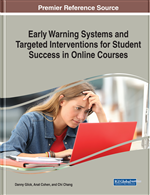
In response to the ongoing shift to remote education, I am conducting a series of interviews with leading industry experts, research scientists and university professors. In this interview series, I seek to explore research-based principles, emerging trends, and initiatives for driving student engagement and success in online courses.
It is my hope that this interview series will be an important step towards helping the education community navigate successfully the “new normal”. View the latest interview below featuring Grainne Oates from Swinburne University of Technology.
Introduction from Dr. Glick
Today I am delighted to be speaking with Dr. Grainne Oates, Associate Professor at Swinburne University of Technology, founder of Quitch, and multi award-winning educator. Her primary research interests are in learning and teaching with a special focus on teaching innovations to enhance the student experience and learning outcomes. She recently developed ‘Quitch’, a content neutral gamified mobile learning platform to enhance first-year student experience. Dr. Oates contributed a chapter “Using Motivational Modelling with an App Designed to Increase Student Performance and Retention” to my new book Early Warning Systems and Targeted Interventions for Student Success in Online Courses.
The Interview Featuring Dr. Oates

DR. GLICK: Good morning, Grainne. Thank you so much for making time for this interview. Globally, more than 1.2 billion students in 186 countries are out of the classroom. As a result, education has changed dramatically, as schools and universities have moved to fully-distance learning models. Concomitant with the boom in online learning are escalating concerns about academic accountability, specifically with respect to student outcomes as measured by persistence (i.e., retention) and success (i.e., final course grade). Learner engagement is another challenge. Many students are feeling disengaged and disconnected, finding it harder to stay focused and keep up with their lessons online.
What are the implications of all this for the design and development of apps, especially in the education space?
DR. OATES: You can’t fight city hall nor put the genie back in the bottle! We must listen to the student voice in finding solutions on how to engage and connect with them. What worked in the past, the sage on the stage does not work now and won’t work in the future. This is why Quitch was co-designed with students. We wanted the solution to work for them. Students were very clear on their requirements for an engaging learning experience: mobile, fun, personalized feedback, positive reinforcement, support in consolidating the primary learning and the ability to see how you are performing compared with peers in real time.
DR. GLICK: Self-regulated learning (SRL) is an overarching term that addresses how students approach their learning, work towards goals, and evaluate and improve their performance. Self-regulated learning intertwines cognitive, meta-cognitive, behavioral, affective and motivational aspects. Research has shown that students benefit most from online learning environments when they are adept at regulating their own learning by actively and thoughtfully capitalizing upon these innovative instructional environments. Ultimately, students who self-regulate are more likely to improve their academic performance, find value in their own learning process, and continue to be effective lifelong learners. However, online students often struggle to self-regulate, which may contribute to lower academic performance of certain student populations.
With this in mind, which design principles may prove effective in supporting students’ SRL strategies in online learning environments?
DR. OATES: I feel that one of the keys here is to chunk the learning, breaking it down in to bite size pieces making it much easier to digest and a more pleasant experience. It’s motivational to be able to complete a task in a timely manner and get immediate feedback on your performance. Students have told me this empowers them to act as they can now see where their areas of difficulty are. They talked about when they leave a lesson they truly believed they understood the material delivered. However, when we pushed to them questions on their mobile devices (nudging concept) on the topics just delivered they discovered they had nowhere near the comprehension they originally believed they had. This encouraged them to go back to the material and get a better understanding. This resulted in improved learning outcomes and grades through consolidation of the concepts. They talked about how they had been ‘fooling themselves’ but could no longer do this as they could now see their results in the App.
DR. GLICK: Evidence from Harvard University (Szpunar et al., 2013) suggests that “…interpolating an online lecture with testing can help students to quickly and efficiently extract lecture content by reducing the occurrence of mind wandering, increasing the frequency of note taking, and facilitating learning.” These findings reaffirm prior research about testing and feedback (e.g., John Hattie), which suggests that specific and timely feedback is the single most important thing a teacher can do for students.
What are the implications of all this for the design and development of apps and teacher dashboards?
DR. OATES: This is critically important. I feel that testing in an online lecture makes for a much more engaging experience for the student, and keeps the mind from wandering. Also, it’s important for the teacher to have the data in real time, as this lets them know who is at risk, allowing them to reach out at the end of that class. We know the sooner we intervene and support, the much greater chance of success for the student. In addition, this testing in the lecture allows us as teachers to identify what content is an issue for the cohort, and so guides us as to what we need to focus on. Quitch delivers real time data on individual and content performance, not just at a moment in time, but also progress over time.
DR. GLICK: Wix defines Inclusive Design as a methodology intended to optimize the products we create for the full spectrum of human needs and abilities. In designing for inclusivity, designers and engineers look to provide a variety of options in which to experience the product, rather than a single, one-size-fits-all route. When we create products and interfaces with just one ideal user in mind, we miss out on the wide range of real life people who come in contact with our designs.
With this in mind, which inclusive design principles should instructional designers and app developers be keeping in mind when designing educational apps?
DR. OATES: We must keep in mind the full spectrum of human needs and abilities in our designs. At Quitch our focus is on human centered design and we continue to work closely with educators and students to ensure their needs are being met. This is an ongoing process. At the end of the day it’s all about connection, genuine human connection. I’d like to reiterate the importance of the student voice in design and solutions.
DR. GLICK: Grainne, thank you so much for sharing your valuable insights!

For more information regarding this research and to review Dr. Glick and Dr. Ying’s research, view the IGI Global publication, Early Warning Systems and Targeted Interventions for Student Success in Online Courses.
Available in print and electronic format, it is available at a 40% discount* when you utilize the coupon code GLICK40 through IGI Global’s Online Bookstore. Additionally, this publication is available across preferred providers such as GOBI Library Solutions, EBSCOHost, Oasis, and Ebook Central (discounts may vary), as well as IGI Global’s e-Book Collection (6,000+ e-books) database.
Visit the publication’s webpage to order, or contact Customer Service at cust@igi-global.com or 717-533-8845 ext. 100 with questions. For researchers, be sure to recommend this publication or the e-Book Collection to your library to have access to this critical content.
About Dr. Danny Glick
Danny Glick is a Research Affiliate at the University of California, Irvine’s Online Learning Research Center where he explores ways to improve student persistence and performance in online courses using early warning systems and light-touch interventions. He is a former visiting scholar at the University of California, Irvine’s School of Education where he investigated the effects of blended learning on the achievement of low-income students. Dr. Glick is also the Director of Pedagogical Implementation at Edusuft, a subsidiary of ETS, where he leads a team of EdTech implementation specialists. For the past 20 years, he has helped ministries of education and higher education institutions in 35 countries to shift from traditional instruction to online learning. Dr. Glick holds a PhD in Learning Technologies and a Master’s degree in Curriculum & Instruction, and has presented and published on topics including early warning systems, targeted interventions, student persistence, and learning design.
About Dr Grainne Oates
Dr Grainne Oates is the Founder of Quitch, a content neutral gamified mobile learning platform. She is an entrepreneur and innovator with a passion for providing a great learning experience for students. She is also an Associate Professor at Swinburne University in Melbourne and has won many awards nationally and internationally for her innovations in education.
For your reference, find below a sample of related titles, which are also featured in IGI Global’s e-Book Collection and are available for purchase in print and electronic format. Be sure to recommend these titles to your librarian, to ensure your institution can acquire the most emerging research.
Disclaimer: The opinions expressed in this article are the author’s own and do not reflect the views of IGI Global.
About IGI Global
Founded in 1988, IGI Global, an international academic publisher, is committed to producing the highest quality research (as an active full member of the Committee on Publication Ethics “COPE”) and ensuring the timely dissemination of innovative research findings through an expeditious and technologically advanced publishing processes. Through their commitment to supporting the research community ahead of profitability, and taking a chance on virtually untapped topic coverage, IGI Global has been able to collaborate with over 100,000+ researchers from some of the most prominent research institutions around the world to publish the most emerging, peer-reviewed research across 350+ topics in 11 subject areas including business, computer science, education, engineering, social sciences, and more. To learn more about IGI Global, click here.
Newsroom Contact
Caroline Campbell
Assistant Director of Marketing and Sales
ccampbell@igi-global.com
(717) 533-8845, ext. 144
www.igi-global.com/*40% discount is only valid on purchases made directly through IGI Global's Online Bookstore. It is not intended for use by book distributors or wholesalers.